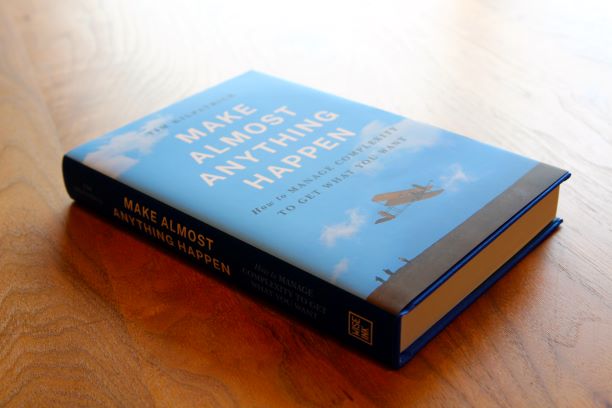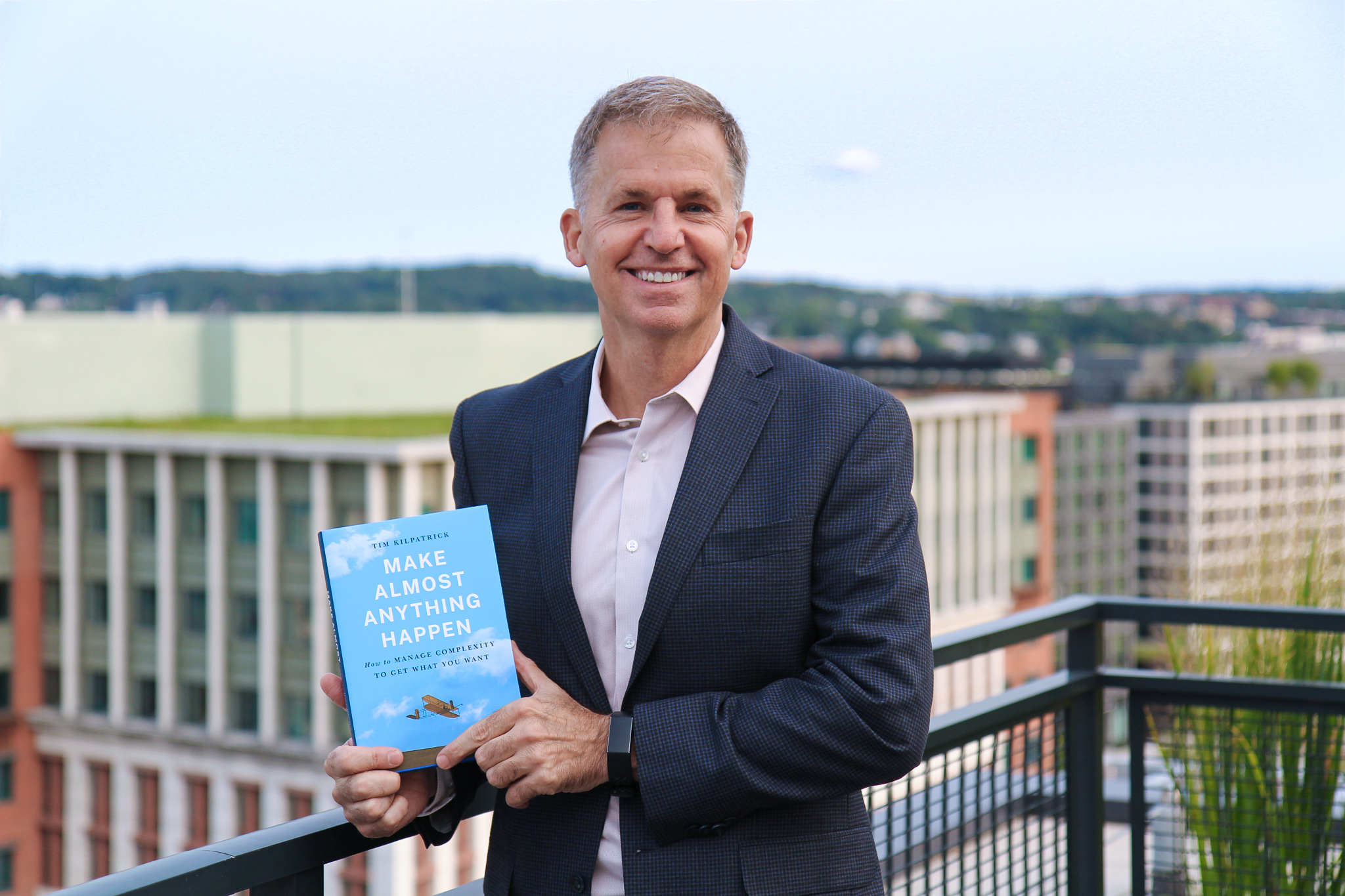
INDIES TODAY – September 23, 2020
Success requires five non-negotiable ingredients and Make Almost Anything Happen: How to Manage Complexity to Get What You Want lays out that recipe in a clear and motivating way. Tim Kilpatrick dives right into the material with a real-life experience from the creator of a well-known product. Through Sara’s experience, he demonstrates the gift of vulnerability and the success we open ourselves up to if we embrace, rather than mitigate it. There are countless other inspiring examples of people, some famous for their accomplishments and others that are unsung heroes, that embody the useful principles considered in this book. (See more)
{ }

I wanted to provide optimism and inspiration to those living with the uncertainty that comes with pursuing complex goals.
While the book was written before the Covid-19 pandemic, it does provides insight into the complexity that is impacting our uncertain futures. The goal was to help people manage the complexity of the many knowns, unknowns, and uncertainties of complex goals.
The book examines how over fifty of the world’s most successful athletes, entrepreneurs, Nobel Laurates, scientists, activists, moms and other unsung heroes achieved success by managing complexity. It provides a framework and a step-by-step process to develop a strategy to achieve a mission while managing the complexity of the many knowns, unknowns and uncertainties.
I decided to write a book about 15 years ago. I was frustrated that most books about the future were not optimistic. This included the titles with positives outlooks combined with predictions of doom if their prescriptive recipes were not followed. Yet, history shows us that gloomy forecasts are usually wrong. I was also looking for a rewarding activity that could fit into the busy schedules of my three young kids and a demanding career. It took me about seven years to complete a first draft. It was not very good. While it was optimistic, it didn’t explain how our optimistic future would happen.
I spent a couple of years researching the difference between success and failure of complex goals. I learned that hard work and knowledge is often not enough. It required managing complexity and embracing uncertainty. I began writing an entirely new book on managing the complexity of complex goals. After three years of writing, I pitched the book three consecutive years to agents and publishers at the Writer’s Digest conference in New York. Each time, I would rewrite the entire book based on what I learned from literary agents, publishers and conference presenters.
Today, I’m happy to share with you the result. (See more)
I hope this inspires people and businesses to begin and stick with their dreams, goals and innovative ideas until they achieve their missions.
{ }

THEBOOKSELFBLOG – September 10, 2020
It’s no secret we live in a very difficult time. We deal with complex issues both personally and professionally. And at times our situations make us crazy with self-doubt wondering how we can better manage our lives.
Fortunately, health care strategist, systems engineer, and entrepreneur Tim Kilpatrick might have the answer in his book Make Almost Anything Happen: How to Manage Complexity to Get What You Want.
(see more)
{ }
MedCity News – August 7, 2020
The annual healthcare budgeting process begins with forecasting future patient volumes, case mix, and revenue. The forecasting model baseline is the current year metrics combined with a track record of forecasting. The stakes are high, as preparing for a five percent growth and only realizing two percent increase can result in millions of dollars of losses. See more.
{ }
Managing Complexity – July 9, 2020
When we decide we want to improve our health, transform our business or launch a new product, we develop a plan and execute it. As described in Why We Struggle with Complexity, we often apply logic and analogies of similar circumstances to make sense of these complex challenges and to determine what to do. We know logic (if this, then that) and analogy (like that, except this) decision making can fail miserably with complexity.
See more
{ }
Patient Well-Being Foundation – April 23, 2018
The mission to transform the United States health care system from volume to value, makes sense to most of us. As with any complex mission, it is challenging to determine how to measure performance of the mission. How do we measure value-based care (VBC)? How do we measure VBC performance in a cost-effective way? With thousands of possible elements that could be measured, it will take many years and iterations to get this right.
A recent study demonstrated major flaws in how Centers for Medicare and Medicaid Services (CMS) measures value in primary care. The study published in the New England Journal of Medicine found that 63% of the performance measures were either not valid or lack evidence to support their validity. See more.
{ }
Managing Complexity – April 21, 2018
When people break into banks, they don’t tend to deposit money. Which explains why JPMorgan Chase and Wells Fargo spend billions of dollars each year on artificial intelligence, physical security and cybersecurity to prevent financial and identity theft.
When Cambridge Analytica compromised 87 million Facebook users’ data, they deposited millions of dollars into Facebook’s bank account. Which may explain why Facebooks’ massive, world-class team of Artificial Intelligence professionals in Building 20 were not working to prevent bad actors from purchasing ads and stimulating users emotions with sensational material (a.k.a. click-bait).
Cambridge Analytica claims they have 5,000 data points on American voters. They leveraged Facebook’s artificial intelligence powered capability that predicts how each of their two billion users will behave, think and purchase. Yes, if you are a Facebook user, they may be able to predict your future behavior better than you. See more.
{ }
Health3-0.com – April 6, 2018
If you have predictable patterns of chest pain, you may be diagnosed with stable angina. When deciding on a treatment, your decision may involve people outside your exam room. Treatment options include lifestyle changes, medical therapy (drugs) and a procedure that inserts a catheter into your coronary arteries to place a stent to improve blood flow to the heart. The procedure is called Percutaneous Coronary Intervention (PCI).
The lifestyle changes and medical therapy options could be selected by you (the patient) and your physician. PCI may require prior authorization by your insurance company that may determine the potential benefit is not worth the cost or that they want you to try lifestyle changes and medical therapy first. While PCI has produced great outcomes for many people with stable angina, a 2007 study found that overall, PCI is no better than optimal medical therapy at alleviating symptoms. Physicians, insurance companies and device makers (stent) may each have different opinions as to whether the costs and risk outweigh your potential benefit from PCI.
See more about the complexity of medical decison making and why health outcomes is often not part of the decision.
{ }
PatientWell-Being.org – March 22, 2018
Don Speranza is in his late 60s and lives on a farm along the Columbia River in Washington state, where he runs a bed and breakfast with his wife. Last year he received an email from his doctor with some test results. “It was like a gut punch, ” Speranza says.
Based on his weight, which crept up to 210 pounds, and his blood glucose levels, he was diagnosed with prediabetes.
Don’s story, recently shared by Allison Aubrey on NPR, is an all too familiar one with one third of the adults in the United States being obese. A recent study predicted that we will have more of these stories with 57% of today’s American children forecasted to be obese by the time they reach the age of 35.
See more …
{ }
ManagingComplexity.net – March 5, 2018
The simple answer is, complex challenges are complex.
While that’s a correct answer, it’s not helpful in improving our abilities to manage complexity. With complexity, we know simple solutions usually fail miserably. That’s unless the solution to a complex challenge fits on a bumper sticker and you are a politician. See more …
{ }


Recent Comments